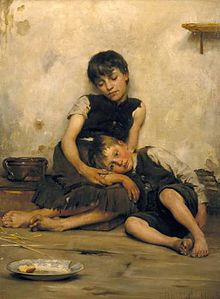Yatima
Yatima (kwa Kiingereza orphan, kutoka Kigiriki ορφανός, orfanós[1]) ni mtoto aliyefiwa au kutelekezwa moja kwa moja na wazazi wake wote[2][3]. Kwa kawaida mtoto aliyewapoteza wazazi wake wote wawili anaitwa yatima.

Watu wazima pia wanaweza kuitwa mayatima. Ingawaje, watu waliofikia utu uzima kabla wazazi wao hawajafariki kwa kawaida hawaitwi hivyo.
Kwa ujumla hili ni neno ambalo hutumika kuelezea watoto ambao wazazi wao walifariki kabla ya wao kufikia umri wa kujitegemea.
Hali ya yatima
haririWatoto yatima mara nyingi huishi katika ukoo wa wazazi, katika nyumba ya yatima au kwa walezi. Katika nchi maskini pasipo mfumo mzuri wa nyumba za yatima kuna idadi kubwa ya mayatima wanaopaswa kuishi kwa kuombaomba au kutafuta riziki kwa kufanya kazi duni na hatari.
Kuasiliwa
haririKama yatima anaasiliwa na walezi anakuwa mtoto wao kisheria[4] ingawa hali hii inaweza kuwa tofauti kulingana na sheria za nchi mbalimbali; hasa nchi nyingi za Kiislamu hazikubali mfumo wa kuasili kamili ila tu mfumo wa "kafala" ambayo ni aina ya ulezi ambapo mtoto anayepokelewa kisheria haitazamiwi kama mwanaukoo. [5]
Katika dini
haririVitabu mbalimbali vya dini, vikiwemo vile vya Biblia[6] na Kurani[7] , vinasema sana kuhusu watoto yatima ili kutetea haki zao na kuhimiza huruma kwao. Muhammad mwenyewe alikuwa yatima.
Takwimu
haririMayatima si wengi katika nchi zilizoendelea, lakini ni wengi katika nchi zinazoendelea au zenye vita.
| Bara | Idadi ya mayatima (mara elfu) |
Asilimia zao kati ya watoto wote |
|---|---|---|
| Afrika | 34,294 | 11.9% |
| Asia | 65,504 | 6.5% |
| Amerika ya Kilatini na Karibi | 8,166 | 7.4% |
| Jumla | 107,964 | 7.6% |
Tanbihi
hariri- ↑ ὀρφανός, Henry George Liddell, Robert Scott, A Greek-English Lexicon, on Perseus
- ↑ Merriam-Webster online dictionary
- ↑ Concise Oxford Dictionary, 6th edition "a child bereaved of parents" with bereaved meaning (of death etc) deprived of a relation
- ↑ Adoption in Tanzania, “Adoption is a permanent legal method of building families. When a child is adopted, the rights of the birth parents and biologic family members of the child are permanently terminated and a permanent and legal bond is established between the child and the adoptive parents”, maelezo ya Idara ya Ustawi wa Jamii, Tanzania
- ↑ Adoption and the Care of Orphan Children: Islam and the Best Interests of the Child Archived 10 Februari 2013 at the Wayback Machine., andiko la Muslim Women’s Shura Council (Marekani) 2011
- ↑ * "Do not take advantage of a widow or an orphan." (Exodus 22:22)
- "Leave your orphans; I will protect their lives. Your widows too can trust in me." (Jeremiah 49:11)
- "To judge the fatherless and the oppressed, that the man of the earth may no more oppress." (Psalms 10:18)
- "Religion that God our Father accepts as pure and faultless is this: to look after orphans and widows in their distress and to keep oneself from being polluted by the world." (James 1:27)
- ↑ * "And they feed, for the love of God, the indigent, the orphan, and the captive," - (The Human: 8)
- "Therefore, treat not the orphan with harshness," (The Morning Hours: 9)
- "So woe to those who do prayer, and are forgetful of their prayer, those who show off and deny help to other." - (Small Kindnesses: 1-7)
- "(Be good to) orphans and the very poor. And speak good words to people." (The Heifer: 83)
- "…They will ask you about the property of orphans. Say, 'Managing it in their best interests is best'. If you mix your property with theirs, they are your brothers…" (The Heifer: 220)
- "Give orphans their property, and do not substitute bad things for good. Do not assimilate their property into your own. Doing that is a serious crime." (The Women: 2)
- "Keep a close check on orphans until they reach a marriageable age, then if you perceive that they have sound judgement hand over their property to them..." (The Women: 6)
Marejeo
hariri- Bullen, John. "Orphans, Idiots, Lunatics, and Historians: Recent Approaches to the History of Child Welfare in Canada," Histoire Sociale: Social History, May 1985, Vol. 18 Issue 35, pp 133–145
- Harrington, Joel F. "The Unwanted Child: The Fate of Foundlings, Orphans and Juvenile Criminals in Early Modern Germany (2009)
- Keating, Janie. A Child for Keeps: The History of Adoption in England, 1918-45 (2009)
- Miller, Timothy S. The Orphans of Byzantium: Child Welfare in the Christian Empire (2009)
- Safley, Thomas Max. Children of the Laboring Poor: Expectation and Experience Among the Orphans of Early Modem Augsburg (2006)
- Sen, Satadru. "The orphaned colony: Orphanage, child and authority in British India," Indian Economic and Social History Review, Oct-Dec 2007, Vol. 44 Issue 4, pp 463-488
- Terpstra, Nicholas. Abandoned Children of the Italian Renaissance: Orphan Care in Florence and Bologna (2005)
External links
hariri| Makala bado ni mbegu. Unaweza kuisaidia Wikipedia kwa kuongezea habari. |